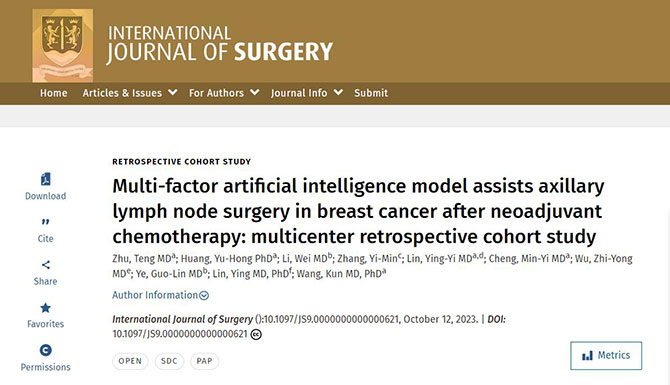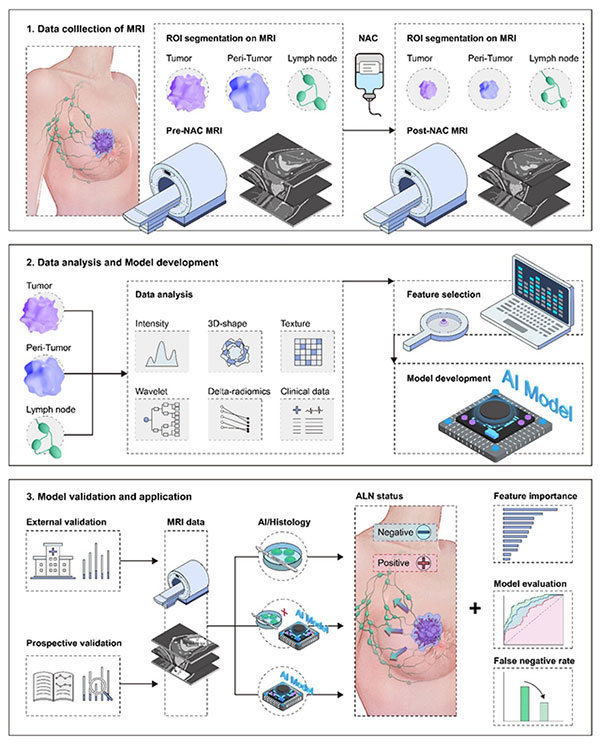

According to the latest statistics of the World Health Organization, breast cancer has become the most common cancer worldwide. Data in China show that about half of patients may have axillary lymph node metastasis at the first visit. According to the latest international diagnosis and treatment guidelines for breast cancer, neoadjuvant chemotherapy (preoperative chemotherapy) has become the standard preoperative therapeutic scheme for breast cancer with initial axillary lymph node metastasis, and can make nearly half of breast cancer patients with metastatic axillary lymph nodes turn negative.
However, the current method of single-minded axillary sentinel lymph node biopsy after neoadjuvant chemotherapy for breast cancer is not accurate enough, and many patients with no postoperative axillary metastasis proved are also forced to undergo axillary lymph node dissection (having larger traumata and more complications) to ensure that axillary lymph nodes that may metastasize are completely excised. Currently, there is no clinical tool for the accurate preoperative prediction of the axillary status of breast cancer patients after neoadjuvant chemotherapy.
Prof. Wang Kun’s team from the Department of Breast Cancer of our hospital has been striving to solve the worldwide problem of how to predict the efficacy of neoadjuvant chemotherapy for breast cancer at an early stage. Since the research findings on the prediction of pathological complete remission of breast cancer after neoadjuvant chemotherapy by temporally dynamic imaging omics were published in eClinical Medicine (impact factor: 17.03), a sub-journal of Lancet, at the beginning of this year, Prof. Wang Kun’s team has published the heavyweight findings titled “Multi-factor Artificial Intelligence Model Assists Axillary Lymph Node Surgery in Breast Cancer after Neoadjuvant Chemotherapy: Multicenter Retrospective Cohort Study” on the top-tier surgical journal The International Journal of Surgery (impact factor: 15.3) in collaboration with the First Affiliated Hospital of Sun Yat-sen University, the First People’s Hospital of Foshan, and Shantou Central Hospital again. The first authors of this paper are Dr. Zhu Teng and postdoctoral fellow Huang Yuhong from Prof. Wang Kun’s imaging omics team, and the first and corresponding authors are both from Guangdong Provincial People’s Hospital. This study is another outstanding scientific achievement of the Department of Breast Cancer under the strong support of our hospital’s Peaking Program this year.

This study aims to transform scientific research achievements into clinical practice. With breast magnetic resonance imaging being the entry point, it establishes a prediction tool based on big data from temporal dynamic magnetic resonance imaging, which realizes the precise preoperative judgment of the axillary status of breast cancer patients after neoadjuvant chemotherapy (with an accuracy of as high as 95%), thereby helping to formulate surgical schemes for breast cancer after neoadjuvant chemotherapy. This method frees a considerable number of patients who have needed axillary lymph node dissection in past clinical practice from major trauma dissection, and truly realizes the accurate individualized surgical treatment of breast cancer!

“This study is the first study in the world that combines big data imaging omics research findings with clinical surgical procedures, and improves the accuracy of axillary sentinel lymph node biopsy after neoadjuvant chemotherapy for breast cancer greatly. We conducted this study in hopes that every clinical research achievement is truly applied to serve patients,” Wang Kun pointed out.
In recent years, the team from the Department of Breast Cancer, Guangdong Provincial People’s Hospital has made excellent achievements in scientific research and clinical practice with the strong support of hospital policies by sticking to our guideline of comprehensive development of medicine, teaching, and research. Prof. Wang Kun’s team has carried out a series of basic, translational, and clinical studies in the field of breast cancer treatment based on clinical practice. Since 2019, the team from the Department of Breast Cancer has applied for eight projects under the National Natural Science Foundation of China and four projects under the Guangdong Natural Science Foundation, and published five high-level SCI articles with a score of over 10 points as the first author, with the impact factors of the SCI articles published totaling over 100 points. For breast cancer patients receiving neoadjuvant chemotherapy, the team is committed to improving the efficacy of neoadjuvant chemotherapy, and developing optimal surgical schemes for patients where possible to improve their postoperative quality of life. In the future, the team from the Department of Breast Cancer will stay true to its original aspiration, keep forging ahead toward the goal of building a world-class hospital, and also bring warmth to breast cancer patients with optimal therapeutic schemes.
Department of Breast Cancer
October 16, 2023